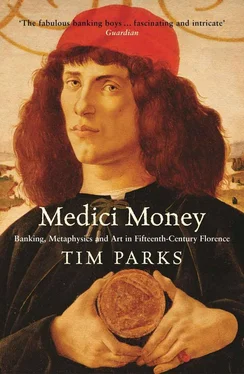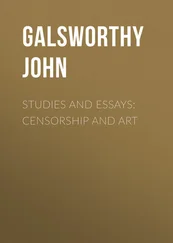As far as possible, the bankers, who are also merchants, get around the problem with triangular movements. Florence buys raw wool from the English Cotswolds. The Florentine banks in London can pay the sheep farmers with the money they have taken in for papal tributes. Florence cleans and weaves the wool and sends finished cloth for sale in Rome, where the local branch of the same Florentine banks can now recover some of the cash previously paid out on behalf of their London branches. There are similar triangles through Venice and Barcelona. But the problem is complicated and sometimes gold or silver has to be sent directly to Rome, hidden in a bale of wool perhaps. Or the Germans send ingots from their silver mines under armed guard. It is not very convenient. Fortunately, there were also the so-called discretionary deposits.
In his twelve years working in his cousin’s business in Rome, Giovanni di Bicci must have learned everything he needed to know to set up a major bank. He learned how important it was for a bank to have its own branches in the major business centers and how to mix financial and commercial transactions across different countries to keep his capital at work. But most of all, he would have learned how important was the difference between the spirit of the law and its application. When the Church asked for loans from a bank, for example, the bank could not ask for interest in return, because usury was a sin. So in its role as trading company, it would increase the price of the goods it sold to the Church to the tune of the interest it felt it deserved from the loans it had made. All the same, when a bishop, or a cardinal, or the pope himself had money to put in a bank and wanted to play investor rather than borrower, he was eager to get something in return. Though it must not be called an interest. And this, as we shall see, was the discretionary deposit.
There were those priests who denounced sin and screamed foul and promised damnation. And there were those who studied canon law to find the loopholes in it. One suspects an underlying complicity between the two groups, the fundamentalists and the compromisers, as between any permanent enemies. They need each other to become themselves. In any event, both sides put a lot of pressure on words, on the way in which a transaction can be described. So discretionary deposits involve discretion in two senses. The name of the deposit holder is kept secret, hence the arrangement is discreet . The holder’s return on the money he deposits is at the discretion of the banker, and thus is a gift and not a contracted interest rate at all, even if it can usually be expected to work out in the region of 8 to 12 percent per annum. Since the banks do not enter into a contractual obligation to make this gift, for that would be usury, and since, on rare occasions when they are losing money, they will not make it, some theologians decide that the arrangement is not usury since there is no certain gain. Others, notably Archbishop (later Saint) Antonino of Florence, consider that since the deposit is made in the hope of gain — for the gift is certainly discussed — then this is “mental usury”; the intention is there and the absence of a contract makes no difference. It is a mortal sin.
Despite the secrecy, we know of many famous holders of discretionary deposits. One was Henry Beaufort, bishop of Winchester, half brother of Henry IV. Was his soul at risk? Cardinal Hermann Dwerg, close friend of Pope Martin V, is said to have lived in “a spirit of evangelical poverty,” while keeping 4,000 Roman florins in a discretionary deposit and accepting Cosimo de’ Medici’s annual gifts. Perhaps the cardinal really did live a frugal life. Perhaps he gave generously to the poor.
Occasionally, arguments would develop when a “gift” rashly promised was not forthcoming. The government of Florence, which of course abhorred usury, considered the habit of giving gifts in return for deposits “laudable” and ruled that promises of gifts must be honored. “Contracts were written in obscure and ambiguous language,” writes the historian Raymond de Roover, “and so became fertile ground for expensive litigation.” The anxiety over mortal sin thus affected not only the actual nature of the financial services offered but also the banking trade’s attitude toward language. A transaction would always be recorded, but its true nature was often camouflaged. What matters, the bankers appreciated, is that you must not be manifestly in the wrong. Obviously, if a bank failed to produce its gift, the clerical customer took his cash elsewhere.
But why would a cardinal in Rome put his money in a bank that — quite apart from the problem of usury — might, and often did, fail? Why not invest it, sin-free, in property, which was rapidly increasing its value in the city and immediately surrounding countryside, or again in jewels? Alas, it was illegal to transfer the Church’s wealth, which included your cardinal’s salary, into the private sector. A new pope was within his rights to confiscate the properties of those who had become rich under his predecessor. Land was visible and vulnerable. The papacy changed hands eleven times in the fifteenth century, not counting the periods when there were two or even three popes. “Sell all that you hath and follow me,” Christ said, but the rich clerics were eager to leave their wealth to their families, their brothers or nephews or bastard children. Given the availability of new credit tools, money had the advantage that it could be deposited secretly and, in the event of trouble, withdrawn in a foreign city.
So, together with the effects of usury, which dislodged a man from his station in life, something else quite unnatural was happening: A person’s wealth was no longer tied to the local community. The actual coinage paid into the bank in Rome by members of Pope Martin V’s family might be quickly paid out in the same place against letters of credit, or tributes collected abroad. Meanwhile, in Avignon, Cologne, or Bruges, the Italian banker who had sold those letters of credit, or collected the tributes, could invest the money in a shipment of almonds from Barcelona, or alum from Turkey, which could then be sold on to London. The Church’s wealth circulated for fear of a new pope, who, unlike a new king or duke, would come from a different family and very likely a different city than his predecessor, bringing an agenda and an entourage all his own.
Giovanni di Bicci must capitalize on that circulation, on the particular turbulence that seems to occur when money meets metaphysics. In 1393 his elder cousin Vieri de’ Medici retired, and Giovanni bought out the Rome branch of the bank. But why, four years later, did he move back to Florence to make the decisive gesture of forming his own bank? And why did Florence become the headquarters of that bank, though it would never begin to equal the profits generated in Rome?
As with the cardinals and their discretionary gifts, the answer has to do with family. How is it, asks an anonymous Genoese writer of the early fourteenth century, that a man will do everything “to acquire power, possessions, lands and goods for the sake of his children, thereby condemning himself to eternal damnation?” It is an interesting question. Just as it’s intriguing in the Divina commedia how many of Dante’s damned seem more concerned with the honor of their family name back in Florence than their eternal torment in hell. Leon Battista Alberti answers the question in Della famiglia , written in the 1430s. Since the family is the social unit par excellence, Alberti says, any attitude or investment that benefits your family or serves to increase its honor is acceptable, for this is the determining purpose of life.
In short — though Alberti would never have put it like this — if making money has become an addiction, nevertheless family allows you to think of your moneymaking as a means to an end. Family offers a value, a reason for living at once more noble than mere accumulation, and more immediate than the pleasures of paradise. And while wealth in money terms might now be cut free from place, family could not. The Medici family was deeply rooted in Florence. There was property and a network of old alliances. If Giovanni had left his wife and children back in Florence when he went to Rome, it was because he himself always meant to return. Doing so, he would cease to be at the outpost of a network and place himself firmly at its center. He would once again exercise his political rights as a Florentine citizen and become a full and feared member of society, something that could never have happened in Rome. The injunction, “keep away from the public eye,” did not necessarily mean, “deny yourself political power.” In fact, one might keep out of the public eye precisely in order to accumulate power. Added to which, unlike the Romans, the Tuscans had a long tradition in running international banks, which were the key to making money, from Rome.
Читать дальше












